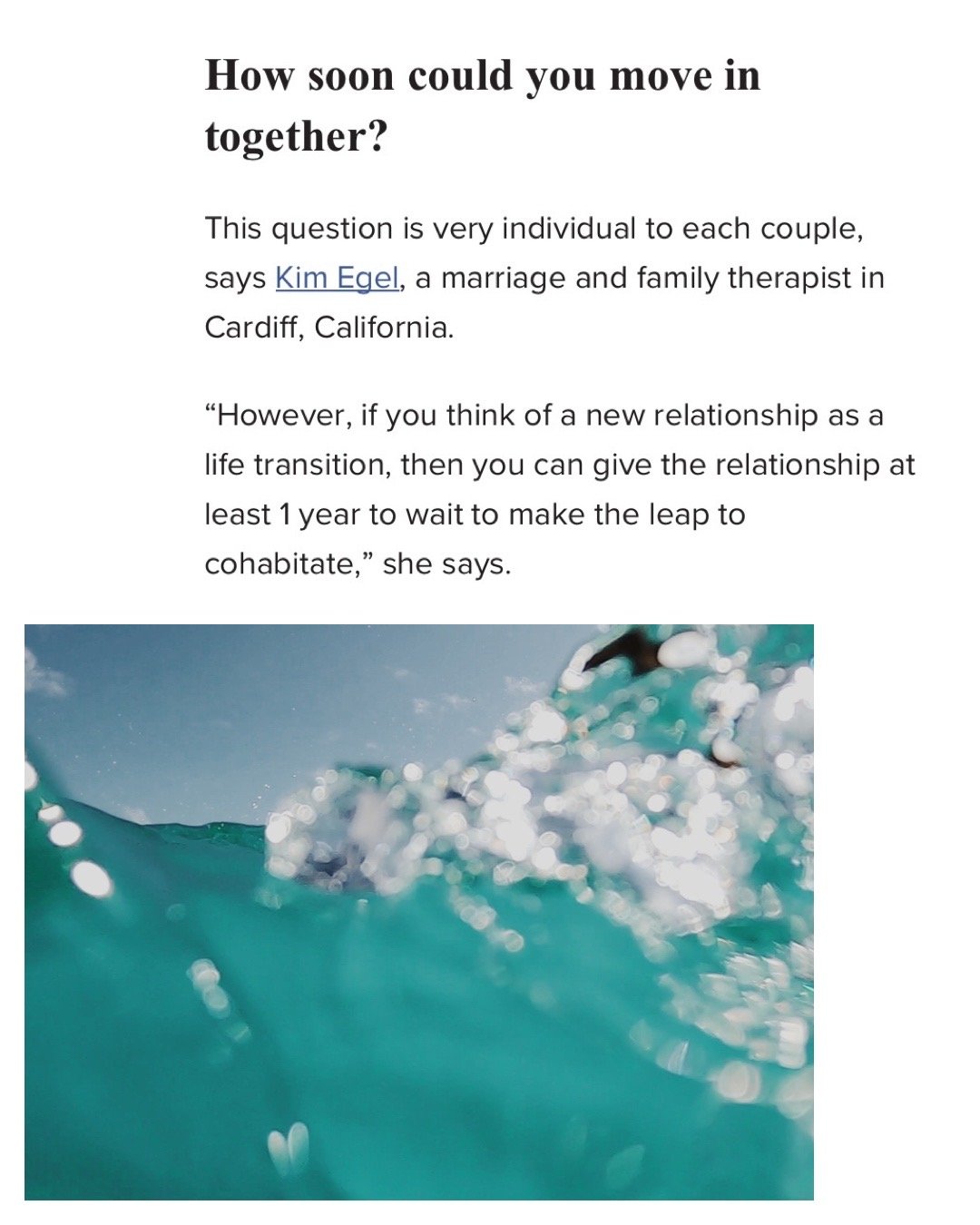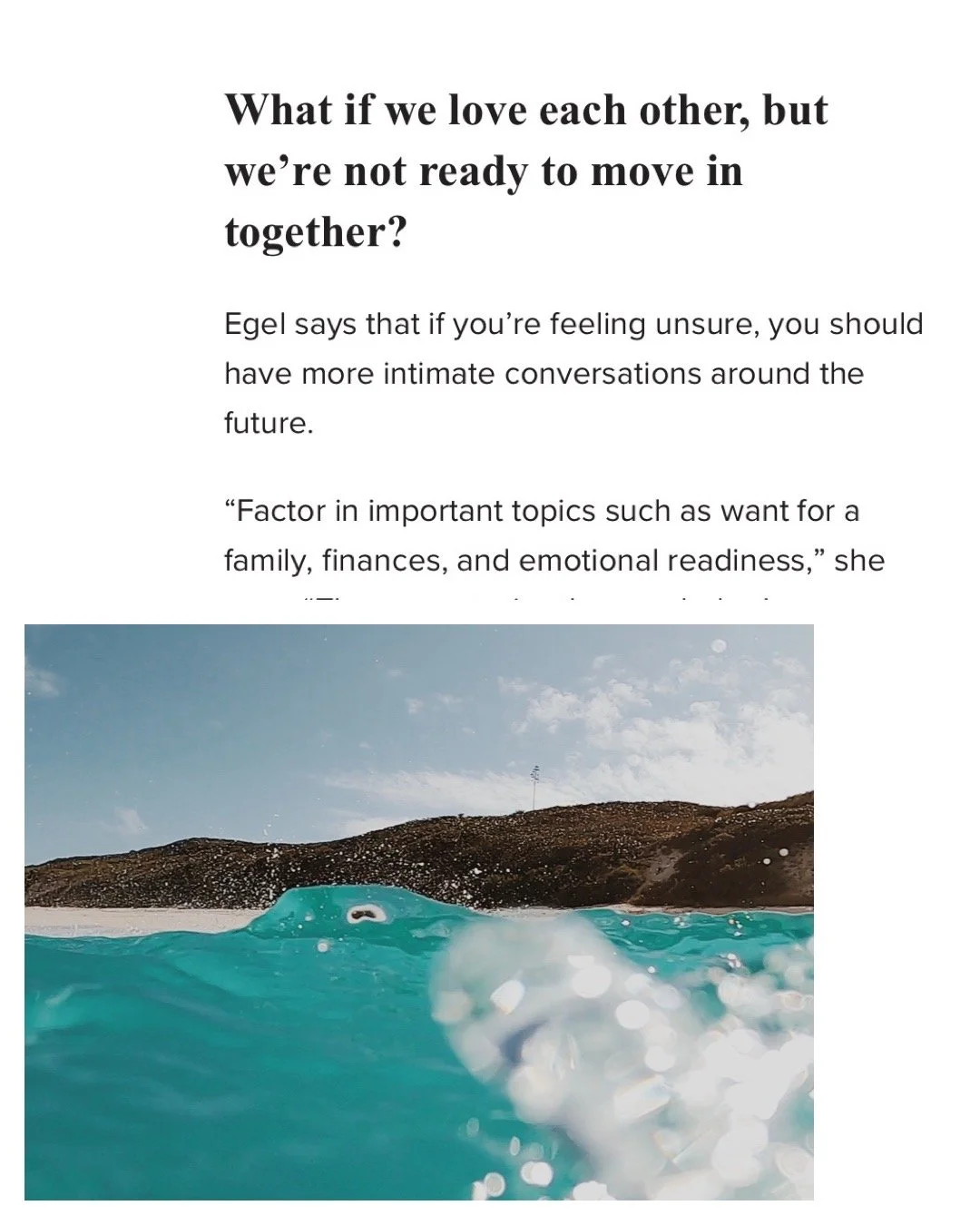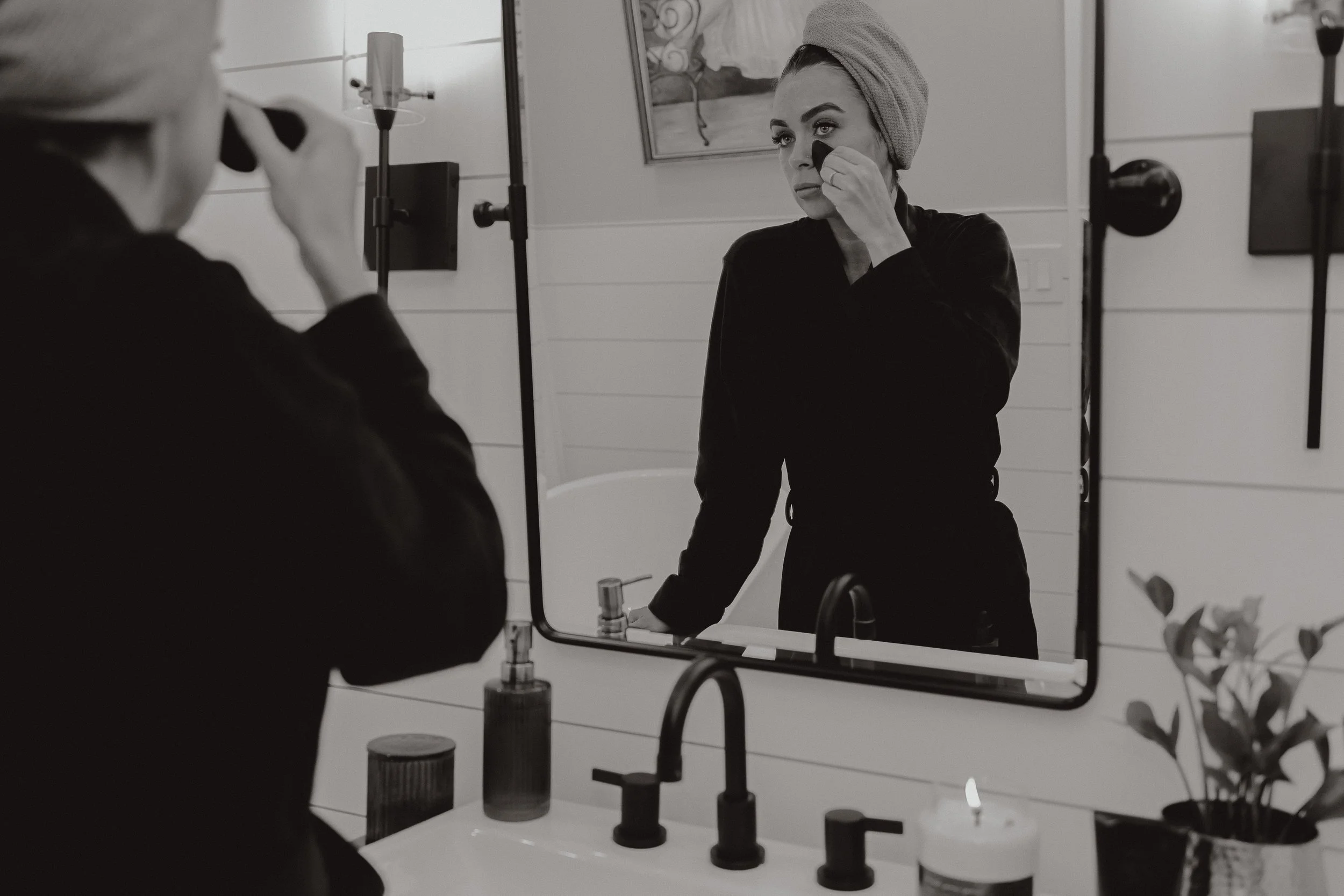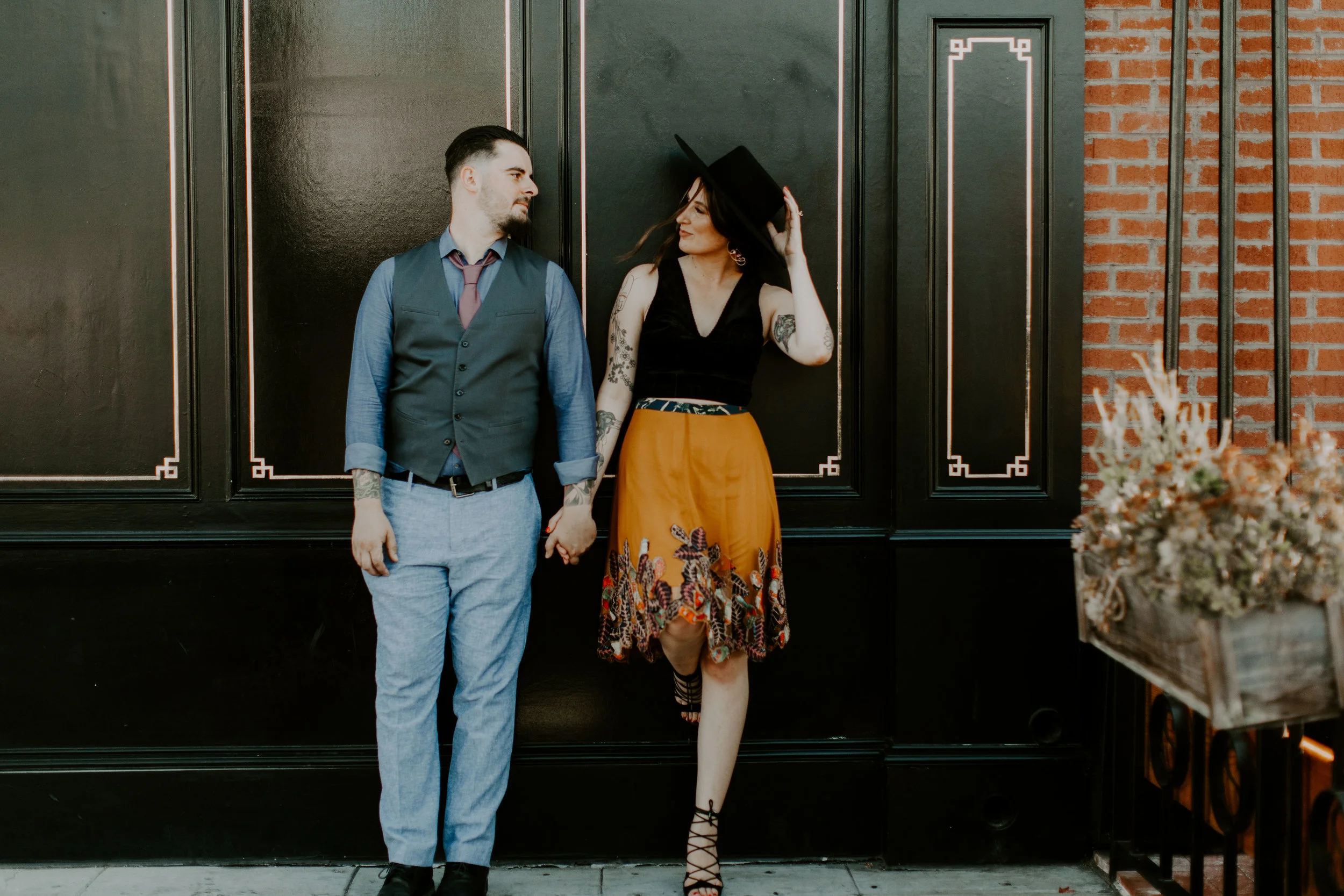Ready, Set, Go? When to Move in Together
If you’re currently considering moving in with a romantic partner this post is for you.
Taking a relationship to “the next level” by moving in together can cause a lot of anxious feelings, even when no “red flags” are present and it’s the obvious exciting next step within a relationship. To say it simply, moving in with a partner is a transition and all transitions in life come with change and the emotions that follow.
I’ve collaborated with PYSCHCENTRAL for this blog topic. Find the full post HERE.
*Above image by photographer and creator of honeyandgarden, Renata Amazonas.
Are You Attracting Emotionally Unavailable Partners? (Identifying Why & Tips to Change)
It’s an utterly frustrating and disappointing experience to be in relationship with an unavailable partner. Especially when your heart has opened and allowed another to enter your sacred space and dance in your intimate light. It can be extremely painful to find yourself tangled up with someone who, simply, doesn’t have the emotional capacity to show up.
Whether you’re in partnership with “the other” who is unavailable, chronically attracting unavailable partners or if you’re in the market to attract a connective, intimate relationship, yet find this pattern following you, this read is for you.
Get ready for it because we’re about to go into the ether and unpack this complex issue.
What Does Emotionally Unavailable Mean?
For starters, let’s define what the psychological jargon of what “emotionally unavailable” even means. The term “emotionally unavailable” suggests that the “other” (the one whom your in partnership with or desiring) currently and for reasons that we can’t know (because it has to do with “their stuff,” not yours) doesn’t have the emotional capacity to hold the space for a healthy, intimate relationship. The problem occurs when we’re hell bent on getting this unavailable “other’s” attention. When our heart sets it target on a specific partner, that “potentially” has so much to offer, it’s hard to remove our tentacles from the object of our affection, for better or worse.
If you’re relating to what I’m saying, let’s keep going, shall we?
There Are Two types of Unavailable That I Want to Red Flag
1.Being, “externally” unavailable, meaning outside factors don’t allow for that other to be available to fully commit to beautiful you. This is where your partner is “literally” and “figuratively” unavailable. This can mean that “the other” lives states or countries away and is not responsive or loyal to a commitment. That other can also be married or in partnership with another. Either way, I label this as externally unavailable. This type of unavailability is more obvious, although is just as trying to be on the other end of.
2. The second type of unavailable and the one I’m going to highlight in this blog is “emotionally” unavailability. I’ve describe that term briefly above and will get into how that can look and feel throughout this read.
Part 1/ How Unavailability Looks
As you may know, we need awareness of “the problem,” in order to change any behavior. With that said, I’m going to clearly define 3 main characteristics that you may experience when on the other end of a partner whose emotionally unavailable.
#1 Avoidant, Inconsistent & Hot & Cold Behavior
A general lack of consistency, accountability and an overall vibe of non responsive behavior points to an unavailable other. Sometimes you may feel like you’re with Casper the Ghost, as that person’s ability to show up and fill the shoes as your partner is just a, straight up, no go. Meaning, sometimes they show up, sometimes they don’t. You never know what you’re going to get. Isn’t that exciting? (No, not really when it comes to your heart and emotions.)
Even if they do grace you with their presence, they may show an inability to be emotionally present and that’s another frustrating experience in itself for the available partner. Someone can be physically “there,” and mentally checked out, which can leave you feeling very alone.
This lonely feeling can push you toward over compensating for the lack of involvement from the “out to lunch” partner. This is where a pattern is born within the healthy partner of doing more than the unavailable partner in order to keep the relationship alive. This pattern will lead to the available person pulling way more weight, which will enable the emotional “check out” of the unavailable other. (Phew, are you with me? Hope so.)
Whether it be that your partner is a “workaholic,” super “busy,” generally flakey, non committal or all of the above, these actions don’t allow for the time and space that it takes to keep a relationship healthy, kicking and balanced.
Keep your eye out for an inability for actions and words to match (this is a big one). For example, the other might be say all the right things, “I love you,” “You’re the most important thing to me,” “I want a future with you,” yet their actions are saying something completely opposite.
For the record; We don’t trust people whose actions and words don’t consistently align, and we should pay attention to this if we’re looking for healthy and fulfilling relationships.
#2 Inability to Engage and Be Vulnerable
A major block that will appear with the unavailable partner is their inability to participate in deep and connective conversations that touch upon emotional issues. One truth when it comes to healthy connection is that communication is key. Without both partners having the capacity to engage in deep and connective conversations, the relationship will be rocky. The depth of connection between partners is correlated to the strength of the relationships foundation. This “depth of connection” is driven by both partners ability to communicate directly and effectively.
For my visual learners out there, here’s an analogy: Think of a house; If a house is built upon a rocky foundation, even if it’s beautiful, it’s just a matter of time that the cracks will appear. The same is so for our relationships. Things like trust, connectivity and our ability to be vulnerable all create the look, taste and feel of our relationships.
An unavailable partner doesn’t have the bandwidth to put themselves “out there” emotionally for whatever reasons under the sun why that is so. (Please refrain (I know it’s hard) from trying to “figure out” and analyze why this is true for that other. That’s their personal work, which only they can do.)
This inability for your partner to hold the space for deep, connective communication will contribute to a relationship feeling stagnant. An unavailable partner will “shy” away from or completely shut down conversations that call them to “put themselves out there.” There can be defensiveness or a sudden topic change to something less threatening to escape the intimidation of vulnerable communication.
When there’s a shut off valve for intimacy, there will be a cap on how far your relationship can evolve. This can leave the healthy, available partner starving for their needs and wants to be met.
#3 You’ll Be on The Other End of Many “Me Focused” Conversations
When someone is unavailable, they tend to find it more comfortable and more “safe” to lead the conversation. A leader tends to have more control. A conversation has less of a chance to go into depthful realms that would threaten the unavailable’s emotional capacity. As the healthy partner, you might find yourself playing a chronic listening role, which is another gateway to burn out and feeling drained. This, again, points to the relationship imbalance where you, as the available one, holds the space for the unavailable other.
How Unavailability Feels
It’s definitely not ground breaking news that being on the other end of someone unavailable can touch upon some tricky and uncomfortable emotions for the available other. To begin with, it can feel utterly confusing. Confusion is present because the other is often saying one thing via their words, but communicating something different via their actions.
It can be extremely disappointing when you’re on the other end of someone whom you love who doesn’t have the tools to be the partner that you need. As I’ve suggested throughout this post, you might also feel drained and exhausted, as you’re the one pulling the majority of the relationships weight. Meaning that you’re the primary one keeping the relationship movin’ and groovin.’ Perhaps this means that you might find yourself being the main initiator when it comes to tasks like calling, texting and making plans.
You might often question: Would it have happened if I didn’t make it happen?
In a nutshell, you may feel like your needs are neglected as the other cannot match your ability to be open and emotionally available, simply because they’re not.
3 Questions For You to Assess Whether Attracting “Unavailable” is a Pattern for You?
1. Do you find yourself continually going toward people who are unavailable, hurtful, rejecting or inconsistent? Has it happened more than 2 or 3 times?
2. Do you struggle with the need to be “in control?” In other words, is uncertainty and being out of control extremely uncomfortable for you?
3. Do you, generally speaking, tend to give more than you get in relationships? Meaning, do you consistently find yourself going above and beyond for others while taking scraps?
How’d that go?! Let’s go over some information that may help you get beyond this pattern.
One thing that’s important to define is the “WHY” in terms of why we stay in relationships that are not fulfilling our needs or no longer making us grow and expand. Here are some reasons to why we may find ourselves remaining in relationships with unavailable suitors.
Part 2/ Reasons Why We Stay
1. We Focus on the Few and Far Between Moments When That Person Showed Up /SLASH/ We Idealize When the Relationship Is and Was Good
Of course we’re going to focus on what we want to see. We do this as humans. It’s not a bad thing to believe in another if there’s a genuine awareness of the issue from the unavailable partner. If there’s awareness paired with efforts toward shifting emotionally unavailable ways, I’m all for working with someone whose trying. It’s when the other remains unwilling to shift when this persistence to “stick with it” is damaging and keeps us, as the available partner, in a relationship longer than need be.
Side Note: There will be a time period where it’s important for you to evaluate the toll that it’s taking on you to stay in partnership with someone unavailable. For example; If that other is not changing their ways and behaviors and you find yourself hangin on by strings, pay attention to how that state is affecting your mental health. Nobody and nothing is worth the destruction of your own mental health. Healthy things and people will not destroy our mental health. I say that with a lot of love and kindness for the other, however, my eye is on you for this post. I want to reawaken your heart and get your blood pumping again so you can get back on track with what you’re here to do. Onward.
2. We Don’t Want to Let Go Because We’ve (Already) Put in So Much Work and Time
I hear you and I think you need to feel your feelings about this. I also believe that it would benefit you to find an alternative perspective besides believing that you “should” continue to stay because you’ve already put in “X” amount of months or years of effort.
Here’s an alternative perspective: How things pan out is FOR YOU. (Including relationships ending)
Trusting life when things are not working out as desired is a brave and, can be, a difficult skill to cultivate. Working toward believing in that notion when you feel defeated can greatly help you. (Just saying.)
All relationships offer us a galaxy of growth. Intimate relationships turn all of our “stuff” around in a way that other things just don’t. They present breeding grounds of triggers into the areas of rejection and wounded parts of self among other things. For this reason, each person that we’re in relationship with acts as a teacher and for that, it’s hard to say that any of the experience was a waste of time. It’s important to know when you’ve outgrown a relationship and when it’s time to go.
Part 3/ Healing Actions
If you’ve concluded that attracting unavailable partners is a pattern for you, there could be some nips and tucks to be implemented on your end of things in order to increase your chances of attracting healthy and available partners in the future. Here are some tips to consider.
1. Invest in Relationships That Are Reciprocal
Reciprocal means that there’s a feeling of balance to the relationship. This is not a tit for tat dynamic; It’s more a feeling that the other puts the amount of effort and care that you’re putting into the partnership.
2. Let Go of the Habit of Doing More Than Your Part in Order to Keep a Relationship Alive
This will call you to look at and work through why you have the tendency to pull way more weight in your relationships than the other partner carries. Usually, you might find that this is true because on a subconscious level, you have an inner knowing that if you don’t put out 80% of the effort, things will fall apart. (We either consciously or subconsciously know that the other partner doesn’t have the want or capacity to step up.) We don’t trust that our partner can pull through based on what history has communicated to us. Control is involved here. We often are controlling things so the relationship stays afloat, for better or for worse. It’s the “I’m going to make it work no matter what” mentality.
Friends, let’s not force. Especially matters of the heart; flow is way more healthy than force.
When we step back from our role of “making it work,” the Truth then has space to unfold. Meaning, either our partner will show us that they can step up and are willing too, or we will witness more dead space. This is a very difficult thing to face; The Truth. So many of us do many destructive things to avoid the Truth. Although, if you’re being called to read this, chances are you’re open to leading more boldly with Truth. Congrats on that!
What I can say to you is, as you lead with the truth life will begin to unfold differently. Nobody said that following truth is an easy journey, yet blinding yourself to the truth is not easy either. Both ways have there own unique challenges, however the way of Truth will lead you to something, well, TRUE. That’s what the Truth does. It’s raw and always interesting and rich.
Hang in there, dig deep and know that you have what it takes to face the Truth. (There’s so much more to say about this, although I’ll leave it for another post.)
3. Think of Yourself Just as Much (If Not More) Than You Think of Others
I’m specifically giving this perspective to those of you who tend to turn toward selflessness. The available partner attracting the unavailable tends to have a track record of doing a lot for others, usually in a very unbalanced way. Without getting into the nitty gritty of how this habit is born (that’s a whole different post) it’s important to start healing and correcting this relationship dynamic imbalance where you’re putting yourself out there to be eaten alive.
The corrective goal is to redirect you from your tendency to put a laser sharp focus on the needs of others. It’s one thing to be observant and kind toward others. It’s a whole other story to set yourself up to get walked over. As you learn to focus on your needs and take up space, you’ll have less tolerance for those that have an inability to emotionally show up.
My hope was for this post to be informative, helpful and hold the space for you to understand why you have been or are currently in a pattern of attracting relationships that don’t give you what you need and desire.
You have a lot to offer babe, so don’t settle. Understanding and correcting what you can will change your point of attraction. When we change our point of attraction by correcting and healing old defeating patterns we begin to get what we need. Hang in there and trust that this is so.
An Invitation For You
If this resonates with you:
Want more reflections like this?
Subscribe to my IAMWELL Newsletter to receive grounded mental-health insights, somatic reflections, and friendly reminders to support a life rooted in slow living, wellbeing, and mind-body connection.
Curious about working together?
You’re welcome to book a brief, free consultation call — we can explore whether we feel aligned in working together. (Reach out HERE.)
Have thoughts or reflections?
Feel free to comment or share — I’d truly love to hear what this brought up for you.
*Above image is by Photographer, Amy Lynn Bjornson.
They Love Me, They Love Me Not: Dealing With Unrequited Love
Needless to say, one situation in life, that can be beyond uncomfortable, stabs at our vulnerability and brings us face to face with rejection is when our love for another is not returned. Simply said, I’m describing liking someone and not being liked back. Feeling feelings beyond friendship and those feelings not being returned by the one we desire can be really painful. It can make us want to run away and hide, literally.
Since this really is a thing that most of us have dealt with, I was asked by @healthline to contribute to an article on this topic of unrequited love. Click the link below to read the full blog post.
They Love Me, They Love Me Not: Dealing With Unrequited Love
*Image by Wedding & Lifestyle Photographer Amy Lynn Bjornson
Why Someone Says They're Not Ready To Date, According To Experts
I’ve linked a BUSTLE article about dating, love and intimate relationships where I was a guest contributor. Dating, finding love, coping with rejection and putting yourself “out there” can be challenging. My hope is for this article to provide you with some clarity around how someone’s rejection is NOT personal to you. It’s just not. Believing that it is can be so damaging. Please don’t do that to your beautiful self.
Enjoy the article below to read about some insights as to why rejection is not personal and says nothing negative about you.
LINK TO ARTICLE
*Above image by, photographer, Amy Lynn Bjornson.
5 Signs That You're Dating a Narcissist
Are you dating a narcissist? If so, this one’s for you.
For those of you who don't know, Narcissism is a legit mental health disorder. Dating a narcissist can take its toll as it requires constant giving via endless validation and listening of your partners grandiose sense of self. This post goes over what you may feel and experience when dating or in a relationship with such a personality type.
What is Narcissistic Personality Disorder (NPD)?
In a nutshell, an individual that fits the diagnosis for Narcissistic Personality Disorder generally has a grandiose view of themself, a burning desire for admiration, and a lack of empathy for others. To get further into clinical diagnostic criteria, according to the Diagnostic and Statistical Manual of Mental Disorders (DSM-5) published by the American Psychiatric Association, here are key characteristics of NPD:
Having an exaggerated sense of self-importance
Expecting to be recognized as superior even without achievements that warrant it
Exaggerating achievements and talents
Being preoccupied with fantasies about success, power, brilliance, beauty, or the perfect mate
Believing that you are superior and can only be understood by or associate with equally special people
Requiring constant admiration
Having a sense of entitlement
Expecting special favors and unquestioning compliance with your expectations
Taking advantage of others to get what you want
Having an inability or unwillingness to recognize the needs and feelings of others
Being envious of others and believing others envy you
Behaving in an arrogant or haughty manner
5 Signs That You’re Dating A Narcissist
1. Since your partner has an inflated sense of self, you find yourself spending countless hours having one sided “conversations” as you listen to the exaggerated triumphs and tribulations of your partners life journey.
2. A narcissist thrives from a deep need of admiration from others, hence, you find yourself in the role of “cheerleader” by giving compliments and praise because that’s the fuel your lover needs to keep their exaggerated sense of self up to par.
3. A narcissist lacks the ability to be empathic to the needs of others, so even though you're the, so called “object of his/her affection,” you find your needs ignored and unacknowledged.
4. Your sense of self is slowly going down the drain. Over time, the constant “about me” vibe that a narcissistic partner brings to a relationship will begin to dim your inner light. This is the where the real damage is done. This will leave you feeling inwardly empty and doubtful as that’s what happens when your sense of self is compromised.
5. You feel taken advantage of and defeated, although it’s confusing because your love for your partner causes you to validate their self serving actions. An intimate partner of a narcissist usually begins to play a subservient role that, unfortunately, will begin to feel “normal” overtime. This role is developed in order to stay in the partnership. We tend to make excuses and get in a strong habit of validating our partners ways of being that, in all reality, are self serving and geared to their best interest, not ours.
It’s always very apparent when a client comes in that’s with or has recently ended an intimate relationship with a narcissist. Usually, the first step in helping this individual is to provide a realistic view of reality for it ‘s become very distorted as a result of being on the other end of someone who has a grandiose, self serving and all consuming sense of self. As a therapist experiencing and helping this type of client, it feels as if your across someone whose been “brainwashed.” Often, their view of reality has been tainted by the material they’ve been witnessing and digesting from their narcissistic partner. My job is to help them rebuild their sense of reality based on facts, rather than the stories that they were encouraged to believe from their partner.
As the term “narcissist” is thrown around very loosely in our society, I truly have seen the scaring effects that this type of partnership has had on my clients. It’s real. It’s damaging and the time it takes to recorrect and restore a persons sense of self takes courage, time and work.
So, babes, to avoid going down this road, make sure that you’re considering yourself, your needs, your wants, ALWAYS, AND especially when you’re choosing a mate. Anybody who continually makes you feel doubtful of yourself, is never asking about you and is always out for number one is simply not a good partner for you. Period.
The charm and rico suave vibe is there with these narcissistic individuals, so don’t let the charm fool you. Go deeper. Choose well. Give your time and energy to someone who sees you, rather than someone whose only interested in seeing themself.
*Another resource on NPD with additional information HERE.
*Image by lifestyle & wedding photographer, Amy Lynn Bjornson.































